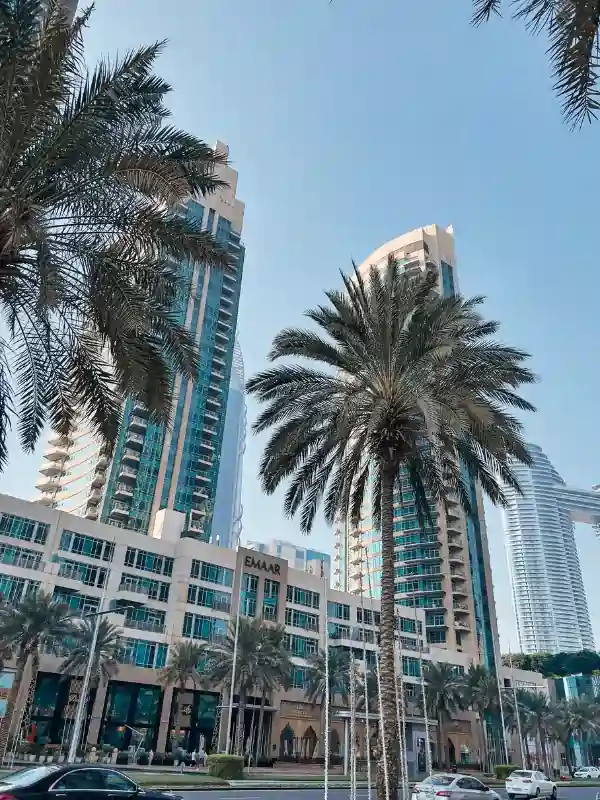Dubai’s vacation rental market is packed with opportunities for entrepreneurs. In the first half of 2025, the city welcomed 9.88 million visitors, already surpassing last year and making it one of the world’s top travel destinations. With over 22,000 licensed holiday homes and a growing demand for short-term rentals, the market is expanding fast.
In this blog, we explore the steps to start a vacation rental business in Dubai, from understanding licensing rules to managing day-to-day operations and seizing the opportunities this booming sector offers.
What is a holiday home company in Dubai?
A holiday home business in Dubai is an enterprise that allows travellers and guests to rent fully equipped houses, such as flats or villas, for a short period. They are more convenient and flexible compared to hotels, allowing visitors to be comfortable at home during their stay.
To do business, the company must have a license issued by Dubai Tourism (DTCM). This ensures the property has met safety and quality checks, allowing the company to rent out its homes through official channels. A holiday home company in Dubai may do a single property or an array of units, providing tourists with a warm and comfortable location to stay in Dubai.
Why is Dubai’s holiday home rental market experiencing unprecedented growth?
Dubai is no longer a mere tourist destination. Among the digital nomads, luxury travellers, and businesspeople who require quality and comfortable accommodation, it has turned out to be an ideal place. The vacation rental business has redefined significantly since current travellers are more apt to prefer private space and personalisation of a holiday house rather than a conventional hotel.
The city’s world-class infrastructure and tourism-friendly regulations give every holiday home company in Dubai a strong foundation for success.
Market performance indicators:
- Vacation rental properties see 71% occupancy citywide.
- 88% of guests come from international markets.
- Peak demand happens in February and April.
- Average annual revenue per property is AED 147,000.
Dubai’s supportive regulations and strong tourism infrastructure provide stability and growth opportunities for vacation rental operators.
How profitable is establishing a holiday home business?
The financial outlook for Dubai’s vacation rental market shows great potential for qualified operators.
Revenue analysis:
- Average property earns AED 147,000 annually.
- Short-term rentals can yield up to 20% higher returns than long-term leases.
- Market growth is projected at 18% in 2025.
- Premium locations can bring even higher returns.
For an ambitious holiday home company in Dubai, rental income is not the only way to be profitable. The sources of revenue include nightly rates, cleaning and service charges, tourist charges (AED 10-15 per room per night), and additional services such as airport transfers, tours, or host services. Profit-making operators develop all-inclusive packages that may be charged at high prices, as opposed to renting out the property.
What are the ten popular areas for holiday home companies in Dubai?
Dubai’s holiday home market is booming, but not every location performs the same. Choosing the right neighbourhood can make or break your returns. To simplify things, we’ve divided the city’s top 10 areas into three categories: Luxury, Mid-Market, and Emerging Value.
Luxury zones – high nightly income & prestige
1. Downtown Dubai
Downtown Dubai, home to landmarks like the Burj Khalifa and Dubai Mall, attracts tourists year-round. In 2025, licensed holiday homes in this area recorded average occupancy rates above 82% during peak months, with average nightly rates ranging from AED 1,200 to AED 1,500. Investors in this district can expect a return on investment (ROI) between 8% and 10%.
2. Jumeirah Beach Residence (JBR)
JBR has a beachfront view and an energetic environment that attracts tourists. The popularity of the area has guaranteed the high occupancy and low rental rates. In 2025, the average night rates will be between AED 1,000 and 1,300 and the occupancy will be 85 percent. The ROI to the investor would be 7-9%.
3. Dubai Marina
The waterfront of Dubai Marina and its close access to entertainment sites make it a favourite destination among tourists. On an average nightly rate, average rates in 2025 are expected to be AED 800 to AED 1,000, with an occupancy rate of 75-80%. Investors are likely to get a 8-10% ROI.
Mid-market hotspots – balanced ROI & occupancy
4. Business Bay
Being a business centre, Business Bay attracts professionals and business traveller, providing stable occupancy and assured returns. By 2025, the average rates will be AED 900-1,100 and the occupancy rates will be 70-75. The ROI that can be expected by investors is 6.5%-7%.
5. Discovery Gardens
Discovery Gardens presents a great value with its low entry point and high rental returns. It is also appealing to cost-conscious travellers due to the family-friendly atmosphere and accessibility of the metro in the region. Average nightly rates are projected to be between AED 500 and AED 700 with occupancy expected to be at between 75 and 80 per cent. The investors can anticipate a ROI of between 7 and 9 percent.
6. Jumeirah Village Circle (JVC)
JVC is a favourite among budget conscious travellers due to the affordability and the family friendly environment. The average nightly rate will fall between AED 600 to AED 800 in 2025 and the occupancy will fall between 80 per cent to 85 per cent. The investors can anticipate a ROI of between 7 and 9 percent.
Emerging value areas – future growth & appreciation
7. Dubai South
Dubai South’s proximity to Al Maktoum International Airport and ongoing development projects make it an emerging hotspot. The region represents a high potential of high rent. By 2025, the average room rate per night will be AED 600-800, and the occupancy is expected to be 65-70 percent. The ROI should range between 8 and 10 percent to investors.
8. Dubai Hills Estate
Dubai Hills Estate is a master-planned community project that has parks and golf courses that attract families and long-term visitors. The average nightly rates will be between AED 700 and AED 900 in 2025, with an occupancy rate of 70 to 75 percent. Investors can expect a 6.5-8% ROI.
9. Meydan (MBR City)
The luxurious services and fast construction of Meydan target high-income tenants. As of 2025, the average rates per night are between AED 800 and AED 1000, and the occupancy level is 65-70 per cent. The ROI is likely to be 6-7 percent among investors.
10. DIFC Area
The Dubai International Financial Centre region is appealing to high-end business travellers and professionals. Its prime place and luxury facilities charge top prices. The average rates are between AED 1,100 and AED 1,400 with an occupancy of approximately 70% in 2025. The investors can expect to get an ROI of 7-8% in the future.
Do you need a license for vacation rentals in Dubai?
This is a must, absolutely. Before renting out a property, every holiday home company in Dubai must be registered with Dubai Tourism (DTCM) and obtain a holiday home license. You can select a one-unit license for your own property or a multiple-unit license if you run several homes.
Dubai authorities take licensing seriously, and unlicensed rentals face severe penalties, including fines of up to AED 50,000 and property closure. Key requirements include:
- Holiday home license- This is a mandatory license granted to any short-term rentals; it has two classes: Individual (owners of property) and Professional (companies), which are to be renewed every year.
- Trade license (for companies) – Needed if managing multiple properties, with business activity listed as “Vacation Homes Rental.”
- 2025 Updates – Stricter safety rules, including fire and electrical checks, and same-day guest reporting via the HH 2.0 system.
Following these rules ensures your business operates legally and safely. If paperwork isn’t your thing, Stratrich Consulting can take care of everything from applying for the license to handling guest registrations.
How to start a holiday home company in Dubai?
Establishing your holiday home company in Dubai requires following a specific sequence of procedures. Any oversight in this process can result in significant delays or compliance complications.
Here’s how someone in 2025 should go about it, in sequence:
Step 1: Check property & building suitability
First, ensure that the short-term rentals are permitted in your house or neighbourhood. Obtain an NOC with the developer or the management of the building as necessary. In case you own, you will need to possess the title deed, in case you lease you will be required to have a tenancy contract and landlord NOC.
As well, make sure that your unit is equipped with all necessary facilities, such as internet, fire safety equipment, appropriate furnishing and utilities (DEWA, water, electricity) are present.
Step 2: Decide your structure (Individual vs. Company)
If you’re only managing up to 8 units, you can apply as an individual.
For larger portfolios or if you plan to operate professionally, you’ll need to set up a company with the right business activity (Vacation Homes Rental / Holiday Homes) under the trade license.
Note: for company setup, name approval rules apply (no abbreviations, offensive terms, or duplicates), and you’ll need a valid UAE residence visa for yourself or your manager.
Step 3: Register on the DET holiday homes portal
Create an account with Dubai Economy & Tourism (DET), upload your ID, Emirates ID, residence visa (if applicable), and relevant property documents.
For tenants, you’ll also need Ejari registration and the landlord’s NOC. Owners submit the title deed.
Step 4: Apply for Unit Permit(s)
Each unit requires a separate permit. Submit detailed documents, including photos, floor plan/layout, amenity list, classification type, and pay the permit fees. DET may review the application and inspect the property before approval.
Step 5: Meet safety, utility & furnishing standards
Your property must comply with DET’s requirements for hygiene, safety, and furniture standards. Basic utilities must be active (DEWA, cooling, water, gas) and cannot carry hidden extra charges. Fire extinguishers, alarms, and first-aid kits are mandatory.
Step 6: Register tenancy (if leased) with Ejari
If you’re not the owner, the lease agreement must be in the unified Ejari format, registered with RERA. All co-living occupants should be included in Ejari records, as DET cross-checks this with your permit application.
Step 7: Obtain license & display certification
Once your unit is classified and a permit is issued; you’ll get your holiday home license. This license number must be displayed clearly in the property and on all online listings (Airbnb, Booking.com, etc.).
Step 8: Guest registration & reporting
Every guest check-in and check-out must be logged in DET’s Holiday Homes system (HH 2.0). IDs need to be verified, and records must be kept for at least five years for audit purposes. Regular inspections by DET may also take place.
Step 9: VAT registration & tax compliance
If your annual revenue exceeds AED 375,000, you must register for VAT.
It is your duty to collect the Tourism Dirham fee (AED 10-15 bedroom per night) and to pay it every month. Also, there is the municipality tax (average 10 percent of booking value) and the permit/license renewal fees have to be paid every year.
Step 10: Maintain compliance & renew annually
Maintain the property requirements to the DET standards, maintain the utilities and safety systems in operation, and renew your permits and license annually. Keep track of changes in regulations, particularly concerning co-living, the deadline of guest reporting, and changes in fees.
What are the documents required for starting a holiday home business in Dubai?
The documents required for starting a holiday home company in Dubai are:
Common documents
- Passport / Emirates ID of owner or authorized signatory
- Application form for holiday home license
- Property details (title deed or tenancy contract, DEWA bill, floor plan)
- Certificate of Good Conduct
- Insurance Policy (minimum AED 500,000 coverage)
Additional documents for company / professional operators
- Trade License from DED (“Vacation Homes Rental” activity)
- Tenancy Agreement for Office
- Company Incorporation Documents
How much does it cost to start a vacation home rental business in Dubai?
Starting a vacation home rental business in Dubai in 2025 entails several expenses, including licensing, setup, and operational costs. Here’s a concise overview:
Preliminary licensing and registration fee:
- Holiday Home License: AED 13,000 (depends on the type and classification of the property) and up.
- Registration Fee: AED 1,520 inc. knowledge and innovation fees.
- Inspection Fee: AED 320 per property inspection.
- Annually Authorization Fees: AED 300 per bedroom.
- Trade License (in case of company): AED 15,000 – AED 25,000
Property setup & compliance:
- Furnishing & Setup: AED 20,000-60,000 (one-time cost depending on property size)
- Home Insurance: AED 1,500-3,000 annually (minimum AED 500,000 coverage)
- EJARI Registration: AED 195 (mandatory for lease agreements)
- DEWA Deposit: AED 2,000-4,000 (refundable)
Ongoing operational costs:
- Tourism Dirham Fee: AED 10-15 per room per night (collected from guests, remitted monthly).
- Municipality Tax: 10% of booking value.
- Property Management Fee: 15-20% of monthly rental income (if using management company).
- Cleaning and Maintenance: AED 200-500 one-time cleaning.
- Renewal of the License annually: AED 13,000+ (depends on the classification).
- VAT Registration: This is mandatory when annual revenue is beyond AED 375,000.
Estimated total start-up cost:
- Individual License: AED 45,000 – AED 85,000
- Company License: AED 65,000 – AED 115,000
*Note: These figures do not include the cost of buying or leasing properties.
How do tax and fee structures work?
It is important to understand the fee structure of Dubai in order to project profits properly. The government has developed an open system, which consists of several elements.
• Guest-Paid Fees
Tourism Dirham is between AED 10 (standard) and AED 15 (deluxe) per room per night. Municipality Tax is 10 percent of the booking value.
• Operator Obligations
Service tax (5% VAT on services), cleaning fee, renewal of permits every year, and charge per room.
Conclusion
The vacation rental industry is growing at an all-time high in Dubai, with visitor numbers increasing 6 percent in 2024 and 22 million visitors projected to drive AED 186 billion in tourism revenue. Yet, winning this market does not only mean buying a property and advertising it online.
The major success factors that have also been identified are the choice of the best locations (Downtown Dubai, JBR, and Dubai Marina are always the best), complete compliance with the regulations, the implementation of a convenient operating system, and using smart prices, which consider all costs and taxes.
Your holiday home business can leverage the booming tourism industry in Dubai with the right planning and professional advice. Stratrich Consultants specializes in Dubai’s holiday home regulations and market dynamics, helping entrepreneurs navigate the setup process and achieve sustainable profitability.
With expert guidance of our UAE expert, your holiday home company in Dubai can take advantage of the city’s thriving tourism market and achieve sustainable profitability.








